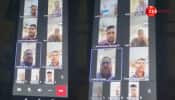Santa Cruz de la Sierra: Pope Francis ventured Friday into a violent, overcrowded and gang-ridden Bolivian prison that even houses children living with their parents, hugging and kissing inmates and urging them not to yield to the "devil."
If other events on the pope`s three-nation tour of South America were joyous ones -- million-strong crowds of worshippers singing and praising the pontiff -- the trip to Bolivia`s most dangerous prison was arguably a humbling descent into hell.
One disconsolate female inmate broke down in tears and threw herself into the pope`s arms, saying she felt utterly abandoned.
It seemed a fitting stop on a grueling tour of his home continent that has centered largely on drawing attention to the plight of the poor and marginalized -- one of the 78-year-old pope`s cherished themes.
The pontiff, who specifically requested the visit to the Palmasola prison, walked slowly through a courtyard where hundreds of prisoners and their families awaited him.
Outside the fence, women in bright orange T-shirts marking the papal visit with his name in Spanish -- Francisco -- cheered the pontiff under a bright sun. One lady held a chubby-cheeked baby high above her head for the child to see.
Back inside the penitentiary Francis exchanged hugs and kisses with prisoners. He also held children in his arms and kissed them, too."The man standing before you is a man who has experienced forgiveness. A man who was, and is, saved from his many sins," said the Argentine-born Francis, the first pope from Latin America.
"That is who I am. I don`t have much more to give you or to offer you, but I want to share with you what I do have and what I love. It is Jesus Christ," the pope said.
The Palmasola prison, nearly 50 years old, was built to hold 600 prisoners but is now overflowing with nearly 5,000 men and women.
A gang war there in 2013 left more than 30 people dead. An estimated 30 percent of the inmates are accused of rape.
The court system in Bolivia, the poorest country in South America, is so backlogged that the vast majority of the inmates at Palmasola have not stood trial yet.
The prison is home to 120 children living with their parents, even though this is illegal under Bolivian law. Some are as young as six.
Advocates for children say that with time, these kids come to adopt jailhouse lingo and refer to themselves as if they were criminal suspects.
The pope also listened to prisoners` stories, like that of a woman named Analia Parada, who said poor Bolivian inmates like herself were subjected to "judicial terrorism."
"The fact that we committed a crime does not mean they should leave us like this, totally abandoned," she said, then broke down and wept and threw herself into the pope`s arms.Since being elected in 2013, Francis has emerged as a champion of the poor and advocate of social justice, and his visit to what is probably one of the grimmest places in an already destitute country suited that track record.
He appealed to the prisoners not to give up hope, and maintain their dignity.
"Being imprisoned, `shut in,` is not the same thing as being `shut out.` Detention is part of a process of reintegration into society," the pope said.
With the overcrowding, violence and all the other problems rampant in the prison, inmates have much to be frustrated over, and these problems must be resolved, the pope said.
"And yet, while working for this, we should not think that everything is lost. There are things that we can do even today," he said.
"Help one another. Do not be afraid to help one another. The devil is looking for rivalry, division, gangs. Keep working to make progress."
The visit was a poignant stop before the pope headed off to Paraguay, where he arrived in mid-afternoon as the final destination of his week-long tour of South America. It started Sunday in Ecuador.
While in Bolivia, the pope was outspoken, calling for an end to what he called "genocide" of Christians in the Middle East and elsewhere.
And in a historic gesture of reconciliation, he asked Bolivia`s mostly indigenous population for forgiveness from crimes committed centuries ago in the name of the Catholic Church.
Ecuador, Bolivia and Paraguay are predominantly Catholic and have been marked by a long history of poverty and inequality afflicting indigenous populations.
Beginning in the 1500s, Spanish conquerors, with the blessing of the Church, subjugated and enslaved indigenous peoples in the Americas, annihilating native cultures and forcing their conversion to Christianity.
















